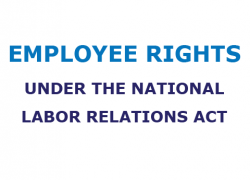The Office of Federal Contract Compliance Programs holds those who do business with the federal government – contractors and subcontractors – responsible for ensuring they do not discriminate on the basis of race, color, sex, sexual orientation, gender identity, religion, national origin, disability or status as a protected veteran. We also ensure that contractors fulfill their affirmative obligation to remove barriers to equal employment opportunity.
Today we’re taking an important step to strengthen OFCCP’s ability to investigate and remedy employment discrimination by proposing to modify a final rule created by the Trump administration.
The 2020 Rule Undermined OFCCP’s Ability to Remedy Workplace Discrimination
In 2020, the Trump administration published a final rule, effective Dec. 10, 2020, “Nondiscrimination Obligations of Federal Contractors and Subcontractors: Procedures to Resolve Potential Employment Discrimination.” The 2020 rule unduly constrained OFCCP’s broad enforcement discretion. Its imposition of formulaic proof standards to be applied to every case harms workers by undermining OFCCP’s ability to effectively bring the full range of cases within its authority and remove barriers to equal employment opportunity.
OFCCP investigates and remedies discrimination in the workplace, both in response to complaints from individuals or organizations and through neutrally scheduled compliance evaluations of federal contractors. During compliance evaluations, we obtain and analyze information about a contractor’s hiring, compensation, promotion and other processes to identify potential violations. Through these evaluations the agency can identify problems such as hiring and pay discrimination, which may often go unaddressed through a complaint process, because workers typically don’t know why they weren’t selected or what their colleagues are paid.
When we identify potential areas of noncompliance during a compliance evaluation, we provide the contractor with a Predetermination Notice describing preliminary indicators of discrimination and invite the contractor to respond, submit additional information, and clarify the issues before we determine whether violations occurred. If the parties are unable to resolve the matter, we will issue a Notice of Violation, which provides the contractor with an explanation of our findings of violations, along with an additional opportunity to respond and attempt to resolve the matter.
If the parties are still unable to reach a resolution, we will issue a Show Cause Notice, providing the contractor with a final opportunity to explain why this matter should not be referred for enforcement. Wherever possible, we work with the contractor to remedy the violations, provide back pay to affected workers, and require the contractor to adopt practices and procedures to prevent discrimination in the future.
In addition to requiring the use of the Predetermination Notice and the Notice of Violation, the 2020 rule imposed inflexible evidentiary requirements early in the compliance evaluation process and attempted to codify complex evidentiary definitions for “qualitative” and “quantitative” evidence and other standards. The rigid evidentiary standards and definitions imposed by the 2020 rule impede OFCCP’s ability to provide contractors with early notification of indicators of discrimination. They also unnecessarily divert agency and contractor resources away from addressing discrimination by giving rise to time-consuming disputes about the implementation of these heightened evidentiary standards.
The 2020 rule disadvantages workers by decreasing the number of contractors we can evaluate for compliance with equal opportunity laws, delaying the resolution of discrimination findings, and potentially leading to the disclosure of information from interviews with workers that may chill workers’ willingness to participate in OFCCP investigations.
Finally, the heightened standards in the 2020 rule impose different proof requirements for OFCCP enforcement that depart from Title VII caselaw and limit the agency’s ability to bring the full scope of cases under its authorities.
OFCCP’s Proposal Would Realign Our Procedures with Our Mission
OFCCP’s proposed rulemaking, “Pre-enforcement Notice and Conciliation Procedures,” would fix the problems created by the 2020 rule and realign our procedures with our mission.
Under the proposal, we would rescind the rigid evidentiary standards for providing employers with notice of discrimination concerns, while retaining the required use of the Predetermination Notice and the Notice of Violation, with modified procedures that allow the agency to consider the facts and circumstances of each case. The proposed rule would retain the regulatory language regarding early resolution, which provides that contractors may waive notice procedures to enter directly into a conciliation agreement.
The proposed modifications would restore flexibility to OFCCP’s pre-enforcement and conciliation procedures, promote efficiency in resolving cases, strengthen enforcement, and promote alignment of the standards governing OFCCP enforcement with Title VII of the Civil Rights Act.
Federal contractors employ approximately 20% of the workforce. OFCCP plays an important role in supporting a more equitable future for all workers. That’s especially critical now, as our nation strengthens our economy and makes substantial infrastructure investments that will create many new jobs on federal contracts.
The Federal Register will publish this notice on March 22, 2022. We will consider all comments submitted on the proposal during the comment period, which ends on April 21, 2022.
Jenny R. Yang is the director of the U.S. Department of Labor’s Office of Federal Contract Compliance Programs.

 U.S. Department of Labor Blog
U.S. Department of Labor Blog



